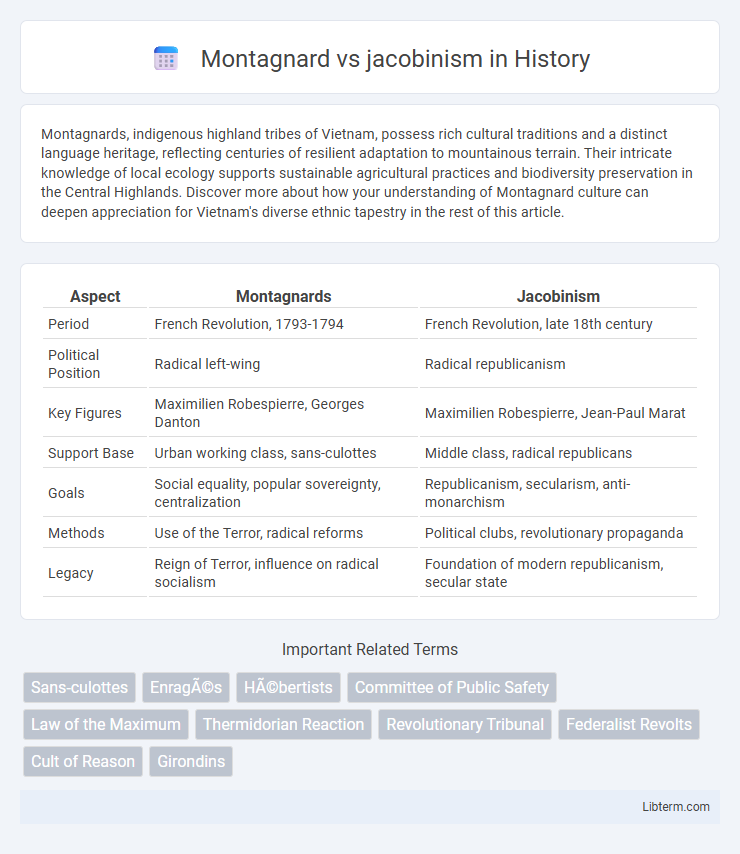Montagnards, indigenous highland tribes of Vietnam, possess rich cultural traditions and a distinct language heritage, reflecting centuries of resilient adaptation to mountainous terrain. Their intricate knowledge of local ecology supports sustainable agricultural practices and biodiversity preservation in the Central Highlands. Discover more about how your understanding of Montagnard culture can deepen appreciation for Vietnam's diverse ethnic tapestry in the rest of this article.
Table of Comparison
| Aspect | Montagnards | Jacobinism |
|---|---|---|
| Period | French Revolution, 1793-1794 | French Revolution, late 18th century |
| Political Position | Radical left-wing | Radical republicanism |
| Key Figures | Maximilien Robespierre, Georges Danton | Maximilien Robespierre, Jean-Paul Marat |
| Support Base | Urban working class, sans-culottes | Middle class, radical republicans |
| Goals | Social equality, popular sovereignty, centralization | Republicanism, secularism, anti-monarchism |
| Methods | Use of the Terror, radical reforms | Political clubs, revolutionary propaganda |
| Legacy | Reign of Terror, influence on radical socialism | Foundation of modern republicanism, secular state |
Origins of the Montagnards and Jacobinism
The Montagnards originated from the radical faction of the Jacobin Club during the French Revolution, emerging as a distinct political group in 1793 known for their association with the mountainous seating in the National Convention. Jacobinism began as a revolutionary political movement advocating for centralized republicanism and radical social reforms, rooted in the Jacobin Club founded in 1789 by Maximilien Robespierre and other early revolutionaries. The Montagnards distinguished themselves by pushing more extreme policies aligned with Jacobin ideology, emphasizing popular sovereignty and the defense of the revolution against counter-revolutionary forces.
Key Philosophical Differences
Montagnard ideology emphasized radical egalitarianism, centralized authority, and direct democracy to enforce the revolutionary agenda, contrasting sharply with Jacobinism's broader republican principles and moderate approach to governance. The Montagnards advocated for swift, uncompromising measures to eradicate counter-revolutionaries, prioritizing social justice and economic equality through aggressive state intervention. Jacobinism focused more on fostering civic virtue and gradual political reform, aiming to balance order and liberty within the revolutionary framework.
Political Goals and Ideologies
Montagnards advocated for radical social and political reforms, emphasizing the empowerment of the lower classes and the establishment of a centralized republican government to eradicate aristocratic privilege. Jacobinism supported the idea of popular sovereignty and nationalism, promoting political equality, secularism, and the use of state authority to enforce revolutionary changes. Both factions aimed to dismantle the monarchy, but Montagnards pursued more extreme egalitarian measures, while Jacobins focused on consolidating revolutionary ideals through centralized power.
Prominent Leaders and Figures
Prominent leaders of Montagnard included Maximilien Robespierre and Georges Danton, who advocated for radical revolutionary policies and strong central authority during the French Revolution. Jacobinism, associated with figures like Camille Desmoulins and Jean-Paul Marat, emphasized political radicalism and the promotion of universal suffrage and republicanism. Both groups played pivotal roles in shaping revolutionary France but differed in their approaches to power and political strategy.
Role in the French Revolution
Montagnards played a radical role in the French Revolution by championing the interests of the common people and pushing for extensive social and political reforms, including the Reign of Terror to eliminate counter-revolutionaries. Jacobinism represented the ideological framework of the Montagnards, emphasizing centralized republicanism, popular sovereignty, and the use of state power to achieve revolutionary goals. Both shaped the revolution by advocating for equality, secularism, and the suppression of monarchy, fundamentally transforming France's political landscape.
Approaches to Radicalism and Moderation
The Montagnards embraced radicalism through aggressive policies aimed at sweeping social and political changes, advocating for direct popular sovereignty and swift revolutionary justice. In contrast, Jacobinism, while similarly revolutionary, practiced a more calculated balance between radical measures and political pragmatism, emphasizing centralized control and party discipline to maintain order. This divergence shaped the French Revolution's trajectory, with Montagnards pushing for immediate and profound transformation, whereas Jacobins pursued moderated radicalism through structured governance.
Social Base and Supporters
The Montagnards drew their primary support from urban working classes, radical sans-culottes, and lower-middle-class revolutionaries seeking aggressive social reforms and direct democracy. In contrast, Jacobinism had a broader base including moderate bourgeoisie, intellectuals, and provincial elites who favored centralized authority and legal equality but were less inclined toward extreme popular mobilization. The Montagnard social base was more revolutionary and grassroots-oriented, while Jacobinism maintained a complex alliance between popular militants and more conservative republican elements.
Influence on Revolutionary Policies
Montagnard influence on revolutionary policies centered on radical social and economic reforms, including the abolition of feudal privileges and the establishment of the Reign of Terror to suppress counter-revolutionaries. In contrast, Jacobinism, as a broader political ideology, emphasized centralized republican governance, secularism, and the promotion of nationalist unity through strict enforcement of revolutionary ideals. Both factions shaped the trajectory of the French Revolution, but the Montagnards' direct control during the Convention led to more immediate and extreme policy implementations.
Conflicts and Rivalries
The Montagnards and Jacobinism were central forces during the French Revolution, with intense conflicts arising over political power and revolutionary ideals. The Montagnards, a radical faction within the Jacobins, aggressively pushed for centralization and social reforms, often clashing with more moderate Jacobins who favored a less extreme approach to governance. Rivalries culminated in purges and executions, notably during the Reign of Terror, as both groups vied for dominance in shaping the revolution's trajectory.
Lasting Legacy and Historical Impact
The Montagnard faction profoundly influenced the radical phase of the French Revolution, championing popular sovereignty and social equality that shaped modern democratic ideals. Jacobinism's legacy endures in its promotion of centralized republican authority and revolutionary justice, which set precedents for future political movements advocating strong state power. Both entities left enduring marks on political theory, inspiring debates on the balance between individual rights and collective governance.
Montagnard Infographic

 libterm.com
libterm.com